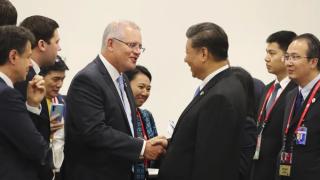Rising trade frictions with China underscore the potential tension between Australia's economic and foreign policy interests. Beijing wants to dramatise these tensions to intimidate Australia and undermine our alliance relationships, while Canberra wants to smooth them over. The United States is watching carefully to see how we manage these tensions and the example we set for other US allies in the region.
China's imposition of crippling duties on Australia's barley exports is the latest shot fired. However, these duties may have less to do with Australia's position on an international inquiry into the COVID-19 pandemic than with Australian industry and trade policy. China instituted its investigation into Australian barley back in 2018, well before the pandemic, and likely would have proceeded with the imposition of duties even if the diplomatic relationship had been smoother.
One of China's conditions for entering into free trade agreement negotiations with Australia in 2005 was that we would treat China as a market economy, but Australia continues to designate specific sectors of the Chinese economy as distorted by government intervention for the purposes of applying specific anti-dumping measures.
China has long-standing grievances with Australia's anti-dumping regime and the often hefty duties applied to imports of Chinese steel, aluminum and other goods. One of China's conditions for entering into free trade agreement negotiations with Australia in 2005 was that we would treat China as a market economy, but Australia continues to designate specific sectors of the Chinese economy as distorted by government intervention for the purposes of applying specific anti-dumping measures.
Anti-dumping law seeks to determine when a foreign exporter is price discriminating between its domestic and export sales. Australia makes these assessments in a way that gives no indication whether the targeted Chinese firm is price discriminating or not. This allows Australian authorities to use made-up prices to arrive at bigger dumping margins and the imposition of higher duties to provide producers with more protection from foreign competition.
Australia's anti-dumping rules and measures have increasingly pushed the envelope of World Trade Organization rules. Indonesia took Australia to the WTO over our imposition of anti-dumping duties on imports of A4 copy paper, a case Australia lost. Trade lawyers have been expecting that China would launch an offensive against Australia's anti-dumping measures at the WTO. Duties on Australia's barley exports are likely a precursor to these actions designed to increase China's leverage. If Australia takes China to the WTO over barley duties, China will also litigate our anti-dumping duties and seek a negotiated outcome in both cases. The barley tariffs give Australia an added incentive to resolve China's complaints.
If Australia takes China to the WTO over barley duties, China will also litigate our anti-dumping duties and seek a negotiated outcome in both cases. The barley tariffs give Australia an added incentive to resolve China's complaints.
China's duties on Australian barley may also be motivated by its "phase one" trade deal with the United States, which requires China to increase its purchases of US exports. By pricing Australian barley out of the domestic market, China can divert demand to US producers. US President Donald Trump's determination to window-dress the US-China trade balance with managed trade deals is a major concern for Australian exporters. China's duties on Australian barley may be a cover for a pivot to increased purchases from the US designed to withstand WTO scrutiny. However, if Australia can substantiate that China has discriminated against our exports because of the US-China trade deal, it could bring a WTO case against China.
In any event, the "phase one" US-China trade deal is a dead letter. Even before COVID-19, the deal was predicated on heroic assumptions about growth in Chinese imports from the US. With the collapse in global demand due to the pandemic, the terms of the agreement will be all but impossible to meet. President Trump has already accused China of not living up to the agreement and has threatened to walk away. China's interest in flattering President Trump's preoccupation with the US trade deficit with China will likely fade along with the agreement. Australia's commodity exports are mostly fungible. If US producers increase their exports to China, this is likely to be at the expense of other trading partners that can take up Australia's exports. That is not to minimise the potential disruption this may cause. It takes time to build new markets, but it is an important factor limiting Beijing's economic leverage over Australia.
Yet the pandemic has shown how the industrial sectors of the US and its allies can quickly pivot in response to an emergency. The combined industrial strength of the US alliance network far exceeds that of China.
The pandemic has also highlighted Australia's export exposure to China through students and tourism. Yet when public health demanded it, we willingly shut down these sectors. In a national security crisis involving conflict with China, Australia would no doubt be willing to bear similar costs. In that event, it may well be that Australia embargoes China. Australia might allow its interests to be eroded at the margin due to threats of economic coercion. Even then, Chinese coercion may only serve to reinforce Australia's conviction in its alliance relationships centred on the US.
The pandemic has also highlighted potential vulnerabilities through Chinese imports. A recent Henry Jackson Society study found that Australia was the most strategically dependent of the "Five Eyes" security partners on imports from China. Yet the pandemic has shown how the industrial sectors of the US and its allies can quickly pivot in response to an emergency. The combined industrial strength of the US alliance network far exceeds that of China.
Prime Minister Scott Morrison has flagged a new focus on "economic sovereignty" and resilience. But this need not come at the expense of international connectedness. For the most part, globalisation increases resilience to shocks. Some of the countries that handled the pandemic well, Singapore and Taiwan, are among the most globally integrated and urbanised economies in the world. While this increased their exposure to the pandemic, it gave them resources to better manage that exposure.
Australia can both engage economically with China while still asserting our vital national interests in conjunction with our alliance partners.






